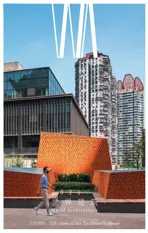梅里雪山既下山酒店,云南,中国
2021-06-30建筑设计赵扬建筑工作室
建筑设计:赵扬建筑工作室
梅里雪山既下山酒店是一个改扩建项目,其前身是季候鸟雪山旅馆。项目位于云南省迪庆州德钦县雾浓顶村,其用地属于这个村子的第23 户人家。季候鸟雪山旅馆本身也是对一个48 柱木框架结构的夯土藏房的改造。当时因为荷载、防水、隔音以及消防验收等问题,用混凝土框架结构替代了原始的木结构,但仍保留了夯土墙和平面中心的天井。旅馆建成之后,成为通往西藏的214 国道上的重要驿站,也是眺望和观赏梅里十三峰全景的最佳地点。
2015 年,行李旅宿的创始人赖国平先生决定把季候鸟雪山旅馆改造为一个小型精品度假酒店。新的酒店将取消“季候鸟”冬季4 个月的歇业期,改为全年营业。这就是梅里雪山既下山酒店的滥觞。
场地策略
改造的第一个需求是要增加使用面积,建筑空间必须突破现状大藏房的格局。大藏房南侧有一片缓坡,顺着坡地望下去,可以完美地俯瞰恬静安详的雾浓顶村。我们从大藏房南面探出一个朝向雾浓顶村的餐厅。餐厅平面呈喇叭形,喇叭嘴插入大藏房外墙上,喇叭口朝南,空间面向雾浓顶村逐渐打开;从剖面上看,餐厅内部地面的阶地形与地形坡度完全吻合,这样,整个空间的向度就跟雾浓顶村完美锁定,每一级阶地上的餐桌都能直接观赏到雾浓顶村的景观。从形体外观上看,这个三角形的餐厅与大藏房的关系相对独立,更好地维护了大藏房单纯的形体印象。
大藏房西北侧和裸露的山体之间留有空隙,我们利用了这个空间增加了两间客房。并用当地常见的毛石墙体覆盖客房立面,让这部分加建的空间给人一个挡土墙的印象。
我们把现状建筑三层的露台封闭起来用作客房空间,让大藏房呈现出一个更简单直接的立方体“完形”,之后把酒吧放到三楼屋顶上,用水平延展的挑檐覆盖一个南、西、北3 面都透明的空间。酒吧的檐口和露台的栏板限定了雪山水平长卷的上、下边界,基本上可以比较有效地截取从中景的飞来寺到十三峰远景的理想画幅。画面没有设定左右边界,取消了框景,视线在完成对雪山的凝视之后会跟随天际线向南北两侧自然转移。
中庭
从冬季保温的角度出发,我们把原建筑的天井覆盖为中庭。中庭是酒店空间的核心部分,也是整个设计中最难把握的环节。首先,为了改变大堂幽暗压抑的状态,我们打掉中庭部分二楼的楼板,改善了大堂进深和层高的比例关系;其次,考虑到4层高的中庭过于高耸,就把中庭部分的地面抬升到第二层,并把这个空间当作图书馆使用。大堂和图书馆空间因此在剖面上联系起来,到达大堂的客人比较容易被高处的中庭吸引而开始一段向上的空间游历。最后,我们用3 段直跑楼梯把地面层的大堂、二层的图书馆和四层的酒吧连接起来。这3 段首尾相接的直跑楼梯是通往雪山酒吧距离最短、转折最少的路径,也是形式上最凝练的表达。从二层到四层的两段楼梯用实体栏板隐藏了支撑楼梯跨度的钢结构,在中庭的东西两侧凌空斜跨,几何的抽象感让这两段楼梯从日常性中抽离,又在纪念性中凸显,一个天光下通往雪山的天梯,隐喻着一段浓缩的“朝圣”之旅。
和天窗相比,高侧窗的光线相对均衡,而且可以避免正午的眩光。我们在中庭顶部东西两侧设置高侧窗,同时用一个曲面的顶棚,把从两侧进入的光线反射下去。曲面可以把直射光扩散开,这样可以保证中庭的光线均匀而柔和。高侧窗用玻璃砖砌筑,玻璃砖也可以进一步起到折射并柔化直射阳光的效果。
这个曲面顶棚西高东低,从剖面上跟最后一段“天梯”倾斜的趋势正相吻合。我们希望这个曲面给人柔软悬挂的印象,而不是一个僵硬的造型。再加上对反射效果的考虑,就想到用若干铜板串接成一张靠重力自然悬垂的“挂毯”。恰好大理旁边的鹤庆就以加工手打铜银的工艺闻名,与工匠交流后,我们决定用1364 块20cm 见方的镶金箔的紫铜板错缝串接成一张54.6m2的“紫铜挂毯”,悬垂于两端高侧窗的顶部。手工打制的铜板表面有密集的凹坑,这也是为了进一步散射光线,让中庭内部通体光明。
其实千里迢迢地来看卡瓦格博就是朝圣。从这个意义上讲,这个酒店就是为朝圣者准备的,它的真身是供奉神山的庙宇,酒店只是化身,它要影响朝圣者面对雪山的姿态和心态。在金顶的光芒下攀爬天梯而接近雪山就是一种仪式,经历了这份庄严再看卡瓦格博,面对雪山的凝视就不再只是一个“国家地理”式的眺望了。
材料与建造
现状的夯土墙外表面有一层用于防止墙体剥落的水泥抹灰,为了恢复夯土墙原初的外观,并满足未来酒店的使用要求。我们拆除并回收了现状夯土墙的泥土,并在内部结构改造完成后,再掺入适量水泥和固土剂重新夯一遍,相当于把夯土墙当作一件羽绒服套在已经用混凝土砌块填充过的主体框架结构之外。这样的夯土墙当然就不再有透气效果,但强度和耐久性都明显提高。改造后客房的窗户扩大到1.5m 宽,远远超出了传统木窗套的跨度极限,于是我们决定用现浇混凝土窗套来替代传统的木窗套做法,并在浇筑完成后打磨成磨石的表面效果,细腻光滑的窗套与粗粝的夯土形成别致的反差。为了让客房的景观不受干扰,我们把窗户的开启扇设计在每扇落地窗的底部。用老榆木制作的窗框因为混凝土窗套的保护也规避了变形开裂的后顾之忧。
紧贴后山的“山房”立面用当地常见的毛石挡土墙饰面,其色调基本和山坡融为一体。为了让餐厅和雪山酒吧的屋面看上去尽可能轻薄,与大藏房厚重的外表形成对比,我们最后决定用铝镁锰合金板来包裹这两个空间的外皮,包括屋顶和立面。这样省去了屋面额外的防水处理,合金板的背面也便于粘贴保温材料,同时也使这两个明显加建出来的空间更有临时建筑的感觉。□
项目信息/Credits and Data
地点/Location:中国云南省迪庆藏族自治州德钦县雾浓顶村/Wunongding Village,Deqin County,Diqing Autonomous Prefecture,Yunnan Province,China
客户/Client:行李旅宿酒店集团/Travelling with Hotel Management Co.,Ltd.
建筑设计/Architects:赵扬建筑工作室/Zhao yang Architects
设计团队/Design Team:赵扬,王典,李乐,David Dufourcq,白皓文,丁乡,张楠,周怡静,刘桔,简雪莲/ZHAO Yang,WANG Dian,LI Le,David Dufourcq,BAI Haowen,DING Xiang,ZHANG Nan,ZHOU Yijing,LIU Ju,JIAN Xuelian
室内设计/Interior Design:谢柯(尚壹扬)/XIE Ke (Shang Yi Yang)
结构设计/Structure Design:马智刚/MA Zhigang
机电设计/Electromechanical Design:北京卡林建筑设计有限责任公司/Beijing Kalin Architectural Design Co.,Ltd.
设计时间/Design Period:2015.10-2016.05
施工时间/Construction Period:2016.06-2018.11
总建筑面积/Floor Area:1961 m2
摄影/Photos:陈颢/CHEN Hao,雷坛坛/Jonathan Leijonhufvud
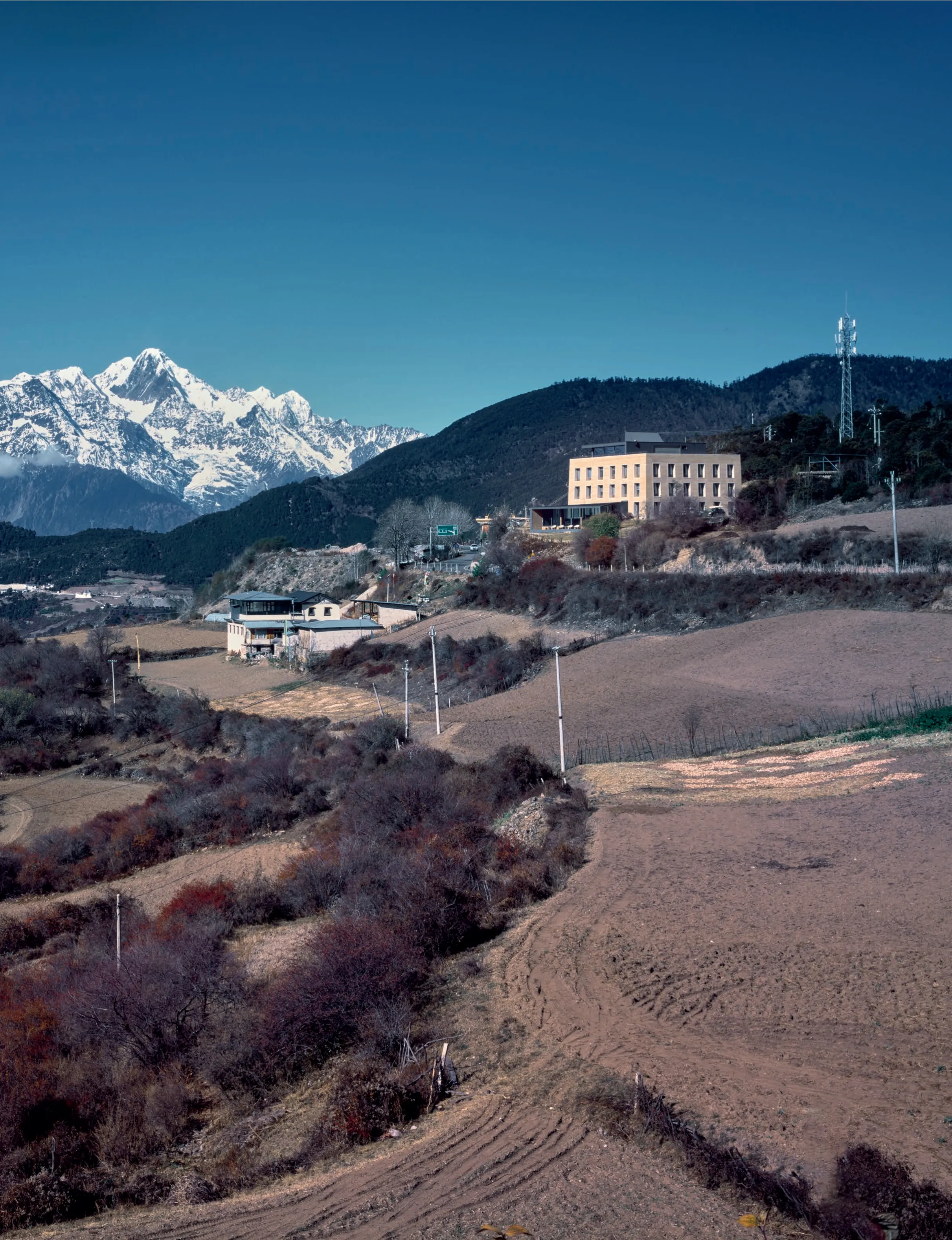
1 远景中的梅里雪山与位于中景右侧的酒店/Meili Snow Mountain in the distance with the hotel on the right in the middle view
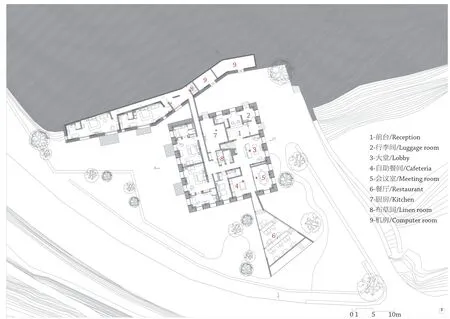
2 首层平面/Ground floor plan
Sunyata Hotel in Meili Snow Mountain is a renovation and extension project.It's renovated from Migratory Bird Inn.The hotel is located at Wunongding village of Deqin county,Diqing autonomous prefecture of Tibetan minority.The land belongs to the 23rd family of the village.Migratory Bird Inn itself was renovated from a vernacular Tibetan house,which had an orthogonal timber frame of 48 columns.Considering the potential problem of load,waterproof,sound insulation and fire protection,the timber structure had been removed and replaced by a concrete frame structure.However,the façade made from rammed earth had been kept,and the square plan layout with a courtyard at its centre had been inherited too.After its completion,Migratory Bird Inn had become a important landmark along the 214 national highway.It has been celebrated as the location with the best vista towards the snow mountain of Kawakarpo,the first of the eight sacred mountains of Tibet.
In 2015,Mr.LAI Guoping (founder of Travelling with Co.) decided to transform Migratory Bird Inn into a small boutique hotel.The new hotel will overcome the severe winter and operates year-round.
Site Strategy
The first priority was to increase the floor area of the project.Therefore,we had to break the limit of the rigid square plan of the rammed–earth house.The gentle slope to the south leads our view to the village that is several hundred meters away.We attach a triangular shaped restaurant to the south façade of the original building.The section of the restaurant fits the inclination of the topography,directing the view of the interior to the village far and bellow.As a result,dining tables arranged on every terrace of the restaurant enjoys the view with ease.
We took the advantage of the gap space between the original building and the rugged edge of the topography to the north,and added two rooms and some service spaces with a façade made from the local masonry.The appearance of this part gives am impression of a retaining wall.
We enclosed the roof terrace on the third floor of the original building and transformed this area into guest rooms.And the lounge with the panoramic view towards the snow mountain was raised to the fourth floor and covered by a horizontal eave and enveloped by giant glass sliding doors.The periphery of the eave and the balustrade of the new roof terrace define the upper and lower boundary of the vista,but the gaze along the horizon drifts smoothly,thanks to the 270°transparency of the lounge.
The Atrium
In order to protect the building from the extreme weather in winter,we covered the courtyard of the original building and transformed it into an atrium.This atrium is the heart of the hotel and also the most difficult part of the design.Firstly,we removed part of the floor of the second floor,and improved the proportion of the lobby space.Secondly,we raised the floor of the atrium to the second floor and created a little library at the bottom of the atrium.The library and the lobby is therefore spatially related on the section,and the arriving guests can be attracted to start a vertical journey from below.Finally,we use three flights of stairs to connect the lobby,the library and the lounge on the top floor.This arrangement of vertical circulation is the most direct and compact design of the stairs we could think of.Especially the two flights from the library to the fourth floor appear almost iconic.The steel truss hiding in the stucco balustrade overcomes the span of the stairs.The abstract form of the stairs creates a moment shifting from the everyday life of a hotel and a sense of monumentality of a religious architecture.We consider a metaphor of a pilgrimage route would be appropriate for the stair leading to the view of a sacred mountain.
We introduced two clerestory windows at the east and west side at the top of the atrium,and a tapestry made from 1364 copper plates is suspended at both ends of the atrium's roof.Therefore,daylight is evenly introduced into the atrium with the help of the reflection from tapestry's gold foil surface.
Considering the remoteness of the hotel,the journey to see the Kawakarpo mountain is itself a pilgrimage.In a way,the hotel can be regarded as a temple worshiping the sacred mountain.It just functions as a hotel.After climbing the ladder in the awe-inspiring space of the atrium,contemplating Kawakarpo is far more than an overlook of the"National Geographic" style.
Material and Construction
The original rammed-earth of the façade was covered and protected by a layer of concrete mortar.In order to fulfil the requirement of the new hotel,we demolished the original façade and recycled its soil.The new rammed-earth facade is solidified by a small portion of fixing agent and cement and is therefore more robust and enduring.The window on the façade is 1.5 m wide,far beyond the capacity of traditional wood window casing.The new window case is made from cast concrete with polished surface.In order to maximise the purity of the view,we put the operable part of the window at its bottom side.The deep recess of the concrete window casing protects the wood window frame from most of the rain,snow and direct sunshine.
We used steel frame structure and metal jacket to erect and envelope the restaurant and the roof lounge.The lightness of structure and materiality give the appearance of these two extension parts a look of temporariness.□
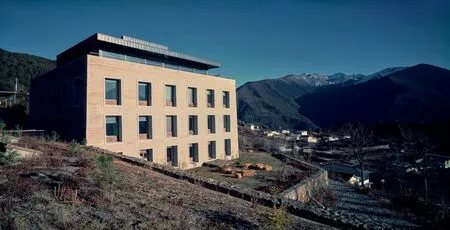
3 从“山房”屋顶看主体建筑西立面/View of the west elevation of the main building from the roof of the "Hill House"
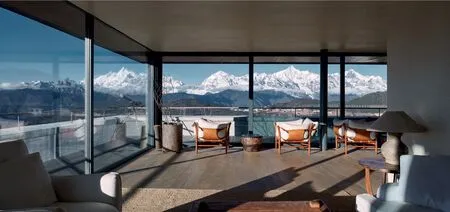
4 从酒店顶层酒吧看梅里雪山/View of Meili Snow Mountain from the hotel's top floor bar
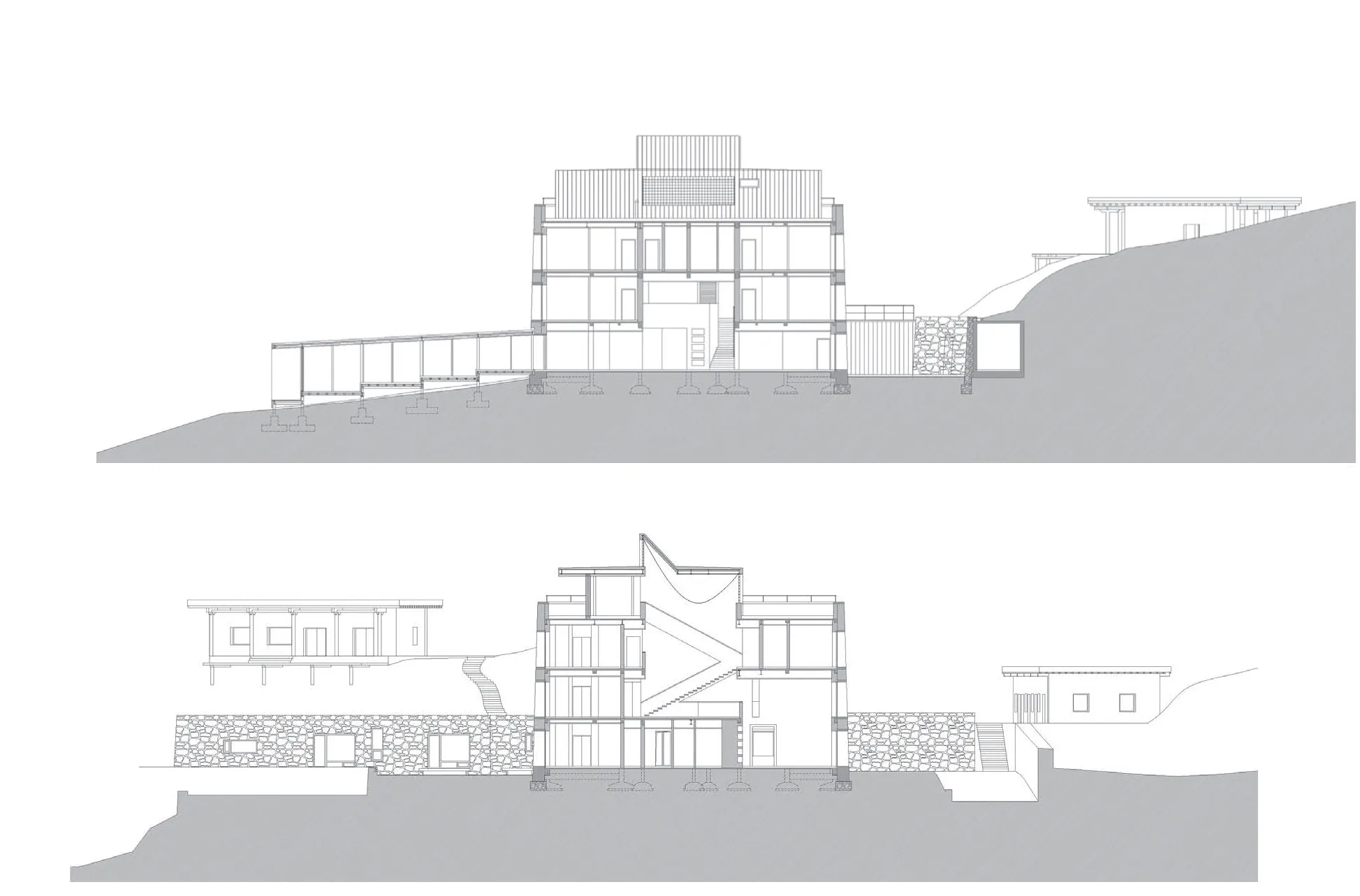
5.6 剖面/Sections
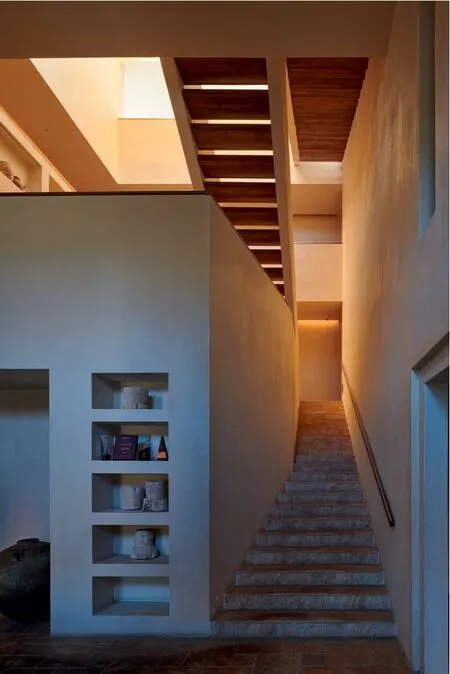
7 从大堂通往图书馆的楼梯/Stairs leading from the lobby to the library
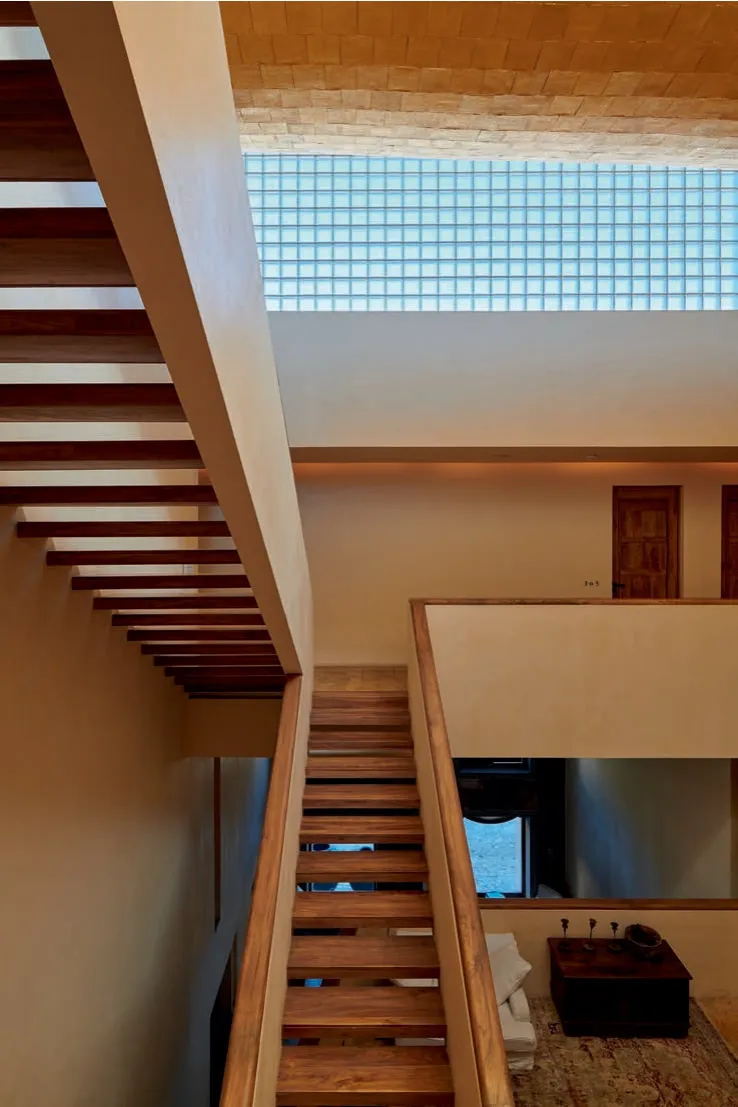
8 从二楼图书馆到四楼雪山酒吧的空间序列/The sequence of spaces from the library on the first floor to the Snow Hill Bar on the third floor
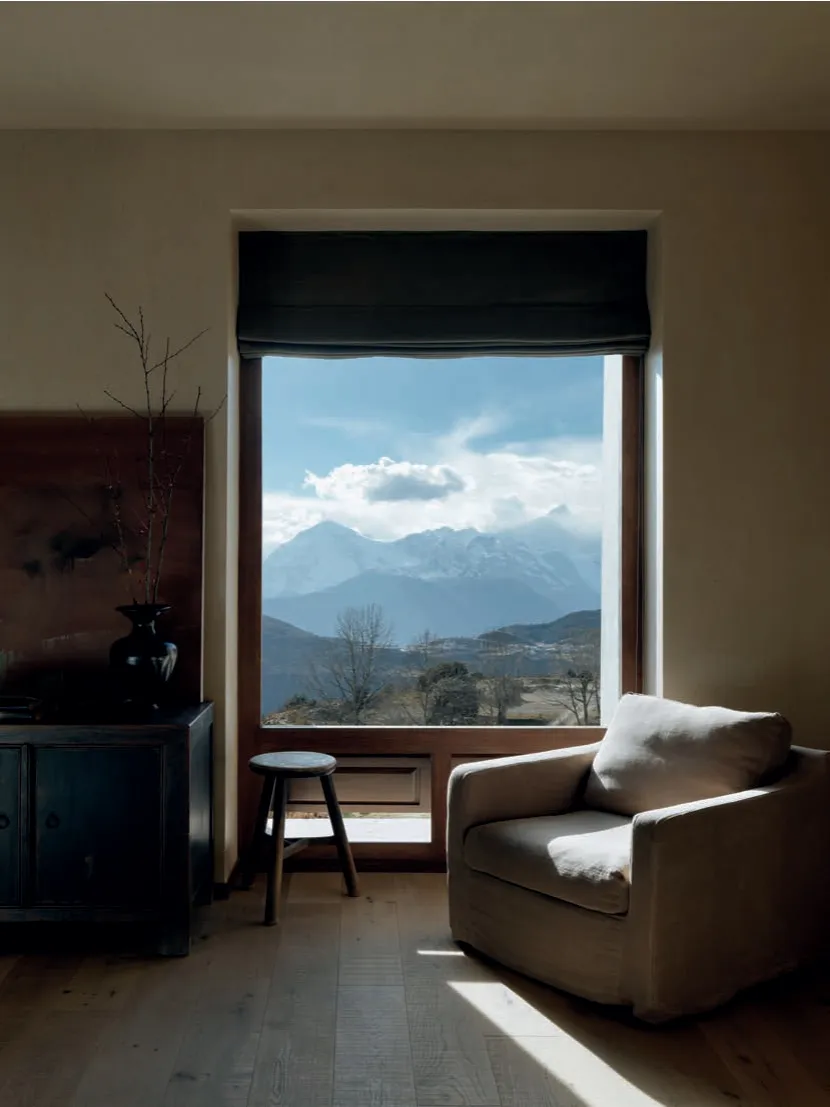
9 从客房窗户看雪山/View of the snow-capped mountains from the guest room window
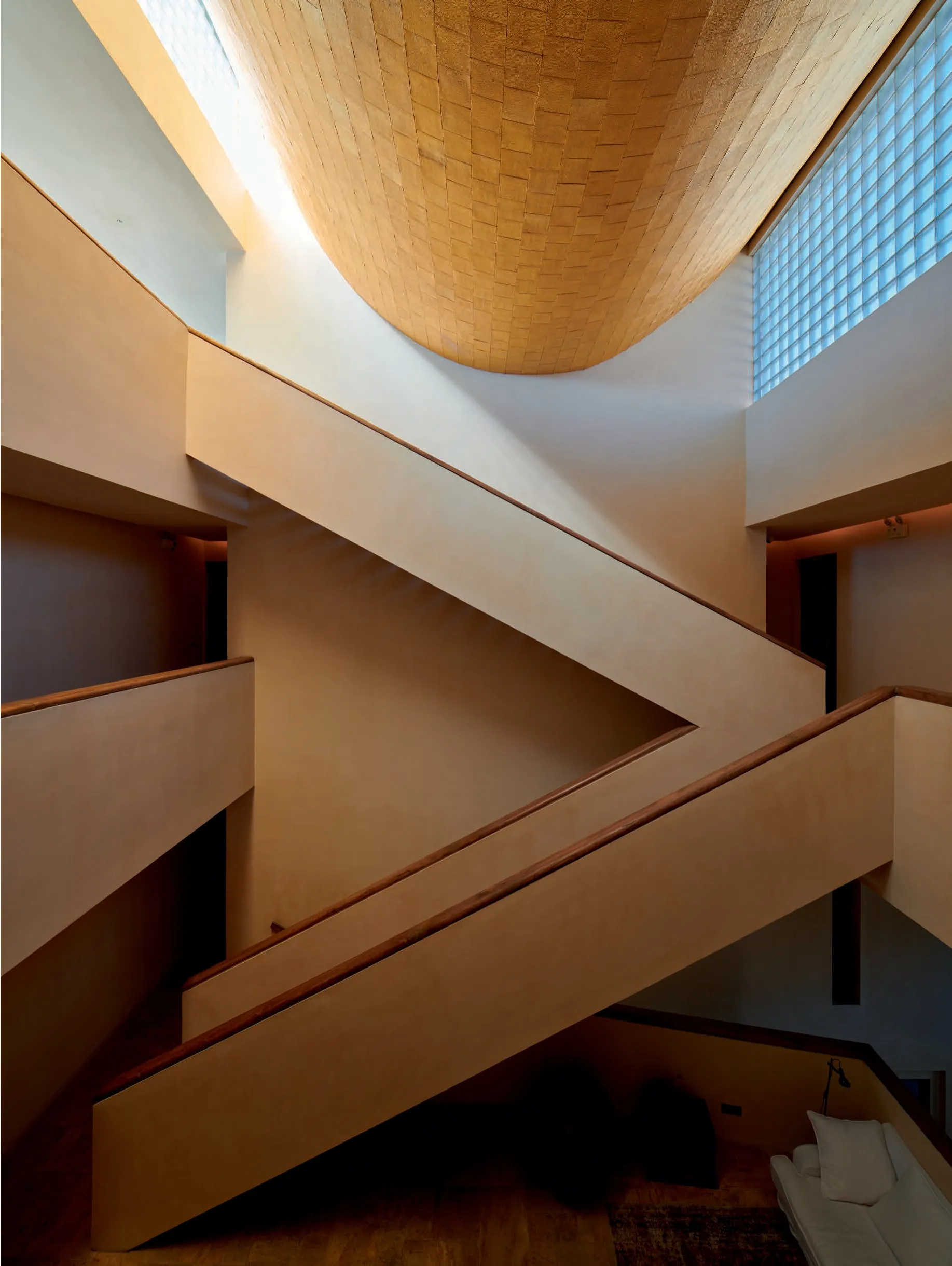
10 金顶与中庭/Golden Dome and atrium
